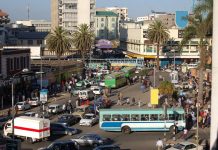For every litre of petrol that you buy, at least Sh47 is taken by the Government. This translates to 42 per cent of the pump price that currently stands at Sh110.59.
The share that the State takes is almost equal to the cost of the product on arrival in Mombasa, which according to this months’ pricing guide was Sh48.
Taxes, however, push it to Sh95.31, while the balance is shared between the oil marketing companies (Sh12.39) and Kenya Pipeline Company (Sh2.89), which stores and distributes the fuel on their behalf.
The amount of taxes levied on petroleum products has been a bone of contention for years as they keep on piling, with the products appearing to be an easy target for the taxman.
Last year, it was a key point of debate after Treasury through the Finance Bill, 2018 reintroduced the 16 per cent value-added tax on fuel.
MPs had initially opposed the tax measure, but it controversially sailed through the House after a good number of them failed to turn up on the day they were to vote either to accept or reject Presidential Uhuru Kenyatta’s suggestion of a compromise.
The tax was levied at eight per cent rather than at 16 per cent. This year, retail prices of fuel have also been affected by more tax measures.
Among the taxes that are on the rise are the Import Declaration Fee (IDF) to 3.5 per cent, up from two per cent and the Railway Development Levy (RDL) that went up to two per cent from 1.5 per cent. Kerosene has also seen a substantial increase in taxation. The fuel, which was retailing at about 30 per cent lower than diesel, is currently at par with it following an increase in excise duty from Sh7 per litre to Sh10 and introduction of the anti-adulteration levy of Sh18 per litre. The latter was introduced to fight the lacing of other fuels with kerosene by unscrupulous traders to shore up volumes mostly of diesel without a care as to how this impacts vehicle and other equipment engines as well as the environment.
The government said it had reduced instances of adulteration to negligible levels. The taxation on petroleum products mirrors other jurisdiction such as South Africa where taxes account for 40 per cent of the retail prices.
Also affecting the price of fuel was an increase in the margins of retailers.
Previously, owners of petrol stations earned Sh3.89 per litre of super petrol sold, but this has more than doubled to Sh8.19. The higher retail margins are at the expense of wholesalers whose margins nearly went down 50 per cent to Sh4.2 per litre from Sh7 previously.Consumers will also be affected by the increase in the retailers’ margin.
Previously, they have paid Sh10.89 per litre as a combined margin for the wholesaler and retailer, but this has gone up to Sh12.39.While pitching for the change in the margins that wholesalers and retailers make, the Energy and Petroleum Regulatory Authority (Epra) noted the formula, which came into effect in 2010, had never factored the cost of operations at the retail level.This informed a split of the retailers’ margin into an investment margin and operating margin.
This, according to Epra, enables the retail outlet operators to take care of their operations while paying rent or recouping investments that went into setting up the station with ease.
“Retail has high operating costs because the owner of a petrol station has to maintain high standards to avoid contamination of products,” said the regulator during a stakholder engagement session to review the formula.
SOURCE: standardmedia.co.ke







![Top 20 Used Cars to Avoid Buying in Kenya – [PHOTOS]](../../../blog/wp-content/uploads/2013/11/top-used-unreliable-cars-to-avoid2-80x60.jpg)
![Here are some of the best tuned cars in kenya by state of the art garages [PHOTOS]](../../../blog/wp-content/uploads/2013/11/29402_10151301757042065_340470732_n-e1384498044289.jpg)


![Top 20 Used Cars to Avoid Buying in Kenya – [PHOTOS]](../../../blog/wp-content/uploads/2013/11/top-used-unreliable-cars-to-avoid2-100x70.jpg)






